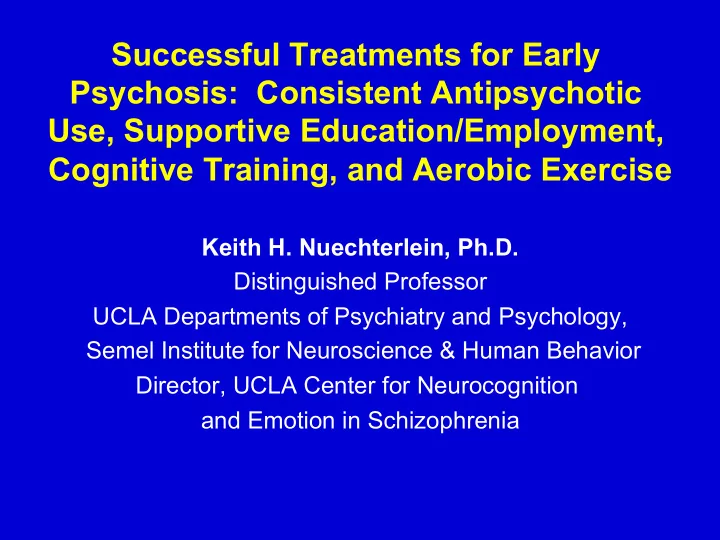

Successful Treatments for Early Psychosis: Consistent Antipsychotic Use, Supportive Education/Employment, Cognitive Training, and Aerobic Exercise Keith H. Nuechterlein, Ph.D. Distinguished Professor UCLA Departments of Psychiatry and Psychology, Semel Institute for Neuroscience & Human Behavior Director, UCLA Center for Neurocognition and Emotion in Schizophrenia
Principles of Individual Placement and Support (IPS) Model (Robert Drake & Deborah Becker) • Work rehabilitation is integral component of mental health treatment, not separate (job specialist w/in clinical team) • Goal is competitive employment in typical work settings • Emphasis is on obtaining jobs directly, rather than after lengthy pre- employment training
Principles of Individual Placement and Support (IPS) Model (Robert Drake & Deborah Becker) • Continuous vocational rehabilitation services based in real work experiences • Follow-along support to sustain employment • Services based on consumers’ preferences and choices • Outreach into community
Percentage Returning to Competitive Work or Regular School (N = 69) 100 90 92 Percentage of Group 80 83 70 60 60 IPS-WFM 50 Separate VR 44 40 41 30 20 22 10 0 Baseline First 6 months 7 to 18 months Adjusting for non-significant baseline differences, Wald x 2 = 7.73, p < . 0054 for 1 st 6 mos.; Wald x 2 = 4.73, p < .03 for next year
Total Number of Weeks in Competitive Work or Regular School Over 18 Months (N = 69) 41.8 50 Total Weeks at Work or 40 25.9 IPS-WFM School 30 Separate 20 VR 10 0 Treatment Group F = 8.43, p < .005
Three cognitive factors account Neurocognitive for 52% of variance in return to Factors Working work or school 9 months later in Memory recent-onset schizophrenia Attention and Perceptual Processing Verbal Memory & Return to Processing Speed Work or Learning of Work Skills School Premorbid Adjustment Schizophrenic Negative Symptoms Disorganized Symptoms Coping by the Environmental Patient and Stress Significant Others Nuechterlein et al., Schiz Bull, 2011
Medication Non-Adherence (from Peter Weiden) • 50% of patients have significant non- adherence within one year of beginning treatment. • 75% within two years. • 50% of the direct medical costs of psychiatric hospitalization attributed to non-adherence.
UCLA Study Design • 12-month randomized controlled trial with first- episode schizophrenia patients at the UCLA Aftercare Research Program • Patients received Individual Placement and Support, a form of supported education and supported employment, to provide a context of active work rehabilitation • After stabilization, patients were randomly assigned to the medication condition and the psychosocial treatment condition (2 X 2 design)
UCLA First-Episode Randomized Controlled Trial of LAI vs. Oral Risperidone: Time to 1st Relapse Kaplan Meier: χ 2 (1) = 9.9, p = .002
Correlations between Antipsychotic Medication Adherence and Cognitive Gains in First-Episode Schizophrenia (n = 57 at 6 months) MCCB Gain in 6 Mo. 0.35 0.3 Correlation 0.25 0.2 0.15 0.1 0.05 0 Overall Working Visual Lrng* Social Cognition Composite* Memory* * p < .05; + p < .10
MCCB Overall Composite Score Covarying for Medication Adherence and Finishing Full 1-Year Protocol (n = 46) 38 36 34 T Score Cog Trng 32 Healthy Beh Trng 30 28 26 Baseline 12 Months Group X Time interaction, p = .025
Global Functioning Scale: Role Effect in 12 Months (n = 53) 6 Work/School Functioning 5.5 5 Cog Trng 4.5 Healthy Beh Trng 4 3.5 3 Baseline 12 Months Group X Time interaction, p = .03, Cohen’s d = .62
Pilot Study of Adding Aerobic Exercise to Cognitive Training • Increasing evidence that aerobic exercise releases neurotrophic factors (e.g., brain- derived neurotrophic factor) that stimulate synaptic plasticity and enhance learning • We hypothesize that adding regular aerobic exercise to neuroplasticity-based cognitive training will increase cognitive gains
Cognitive Training & Exercise (CT&E) Might Enhance Impact on Global Cognition (MCCB Overall Composite Score) (n = 14) 39 MCCB Overall Composite 37 35 CT&E T Score 33 CT 31 29 27 25 Baseline 10 Weeks Estimated effect size, Cohen’s f = 0.48
Cognitive Training & Exercise (CT&E) Might Enhance Impact on Social Cognition (n = 16) 44 Composite T Score 42 MCCB Overall 40 38 CT&E 36 CT 34 32 30 Baseline 10 Weeks Estimated effect size, Cohen’s f = 0.65
Overall Conclusions • Supported education/employment can strikingly increase the proportion of patients who return to school or a job after an initial psychotic episode. • Long-acting injectable antipsychotic medication is a promising strategy for reducing relapses and improving cognition and everyday functioning in recent-onset schizophrenia.
Overall Conclusions • Systematic cognitive training can impact cognitive functioning and everyday functioning in the early course of schizophrenia. • Aerobic exercise and cognitive training might have synergistic effects on learning and overall cognitive functioning that enhance the impact of cognitive training alone.
UCLA Aftercare Research Program Staff Investigators Statistical Consultation Keith H. Nuechterlein, Ph.D. (P.I.) Gerhard S. Hellmann, Ph.D. Kenneth Subotnik, Ph.D. Catherine Sugar, Ph.D. Joseph Ventura, Ph.D. Sun Hwang, M.P.H. George Bartzokis, M.D. Sarah McEwen, Ph.D. Denise Gretchen-Doorly, Ph.D. Research Assistants Craig Childress, M.A. Treating Psychiatrists Kimberle Kelly, M.A. Michael Gitlin, M.D. Robin Kite, M.A. Laurie Casaus, M.D. Jacqueline Hayata, B.A. John Luo, M.D. Lilian Medina, B.A. Michael Boucher, M.D. Rachel Wood, M.A. Arielle Ered, B.A. Case Managers/Therapists Nicole R. DeTore, M.A. Research Center Administrator Luana Turner, Psy.D. Fe Asuan, B.A. Yurika Sturdevant, Psy.D.
Recommend
More recommend